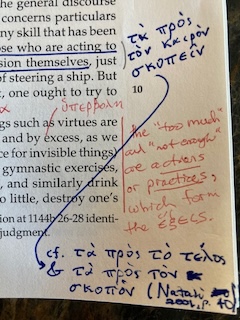
Recently someone asked me how I approach the reading of timeless books, so here are a few thoughts; perhaps you'll find this post helpful in your own reading practice. (I read "timely" books differently, but it's the timeless ones that I care about most.)
First, when I want to truly understand a book, I read a physical copy. Yes, I maintain a large website of books in the public domain, and I'm continually posting old books there, which I read on my phone (e.g., I'm doing that these days with Shakespeare). But when I want to go deep, invariably I do so on paper so that I can focus on the text without distractions, pore over passages, flip back and forth, etc.
Second, timeless books reward multiple readings. With some books I'll read a chapter and then re-read it a day or two later; this is how I'm currently reading Heidegger's Being and Time because it's difficult to figure out his meanings. With others I'll read the book several times over a span of years; I've done this with essayists (e.g., Montaigne), playwrights (e.g., Ibsen), novelists (e.g., Hugo), poets (e.g., Dickinson), and philosophers (e.g., Lao Tzu).
Third, if the author originally wrote in a language other than English, I often consult several translations. This is especially important if I don't know the source language, as with Montaigne and Lao Tzu. And if I do know the source language, I try to check key passages against the original text.
Fourth, when I'm working through an author that I'm encountering for purposes of writing a book of my own, I read everything they've written, note key passages, and pay particular attention to those passages the second time around (I've done this especially with Nietzsche, Thoreau, and now Aristotle).
Fifth, I've become more comfortable with marking up books. In days gone by I treated them as sacred objects, but now I willingly apply pen and pencil to paper. Here, for instance, is a passage in Book II, Chapter 2 of Aristotle's Nicomachean Ethics:

Here you can see that I've marked up this passage on three separate occasions: the first time in pencil, the second time in red ink, and the third time in blue ink. That's intensive re-reading!
Sixth, I sometimes write summaries or blog posts about books that strike me as especially significant; this helps me to recall what I've read and to formulate my own thoughts in response.
Finally, I'm quite choosy about the books I read this deeply. To me, it's more important to have truly meaningful encounters with relatively few books than to check off every item on some arbitrary list of the greatest books in world history. This gives me the leisure and luxury of reading slowly, deliberately, intensively, passionately. If you ask me, timeless books deserve no less.
(Cross-posted at philosopher.coach.)
FOR FURTHER EXPLORATION